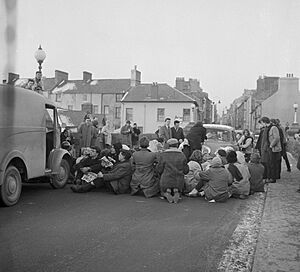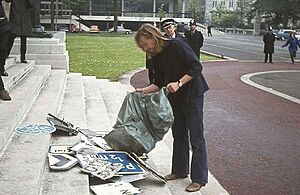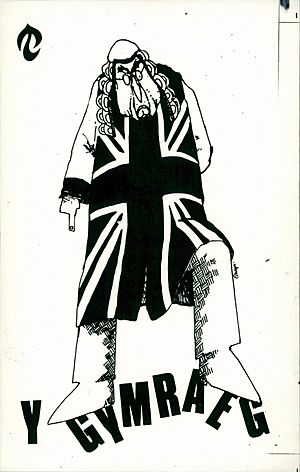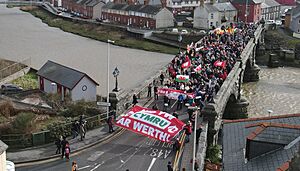Welsh Language Society facts for kids

Tafod y Ddraig (the Dragon's Tongue), the society logo
|
|
| Formation | August 4, 1962 |
|---|---|
| Founder | Owain Owain, John Davies, Geraint Jones (Trefor) |
| Type | Advocacy group |
| Purpose | Welsh Language rights, Welsh Nationalism |
| Headquarters | Aberystwyth, Wales |
| Fields | Minority language movement, Anti Globalization |
|
Chairperson
|
Robat Idris |
| Website | cymdeithas.cymru |
The Welsh Language Society (Welsh: Cymdeithas yr Iaith Gymraeg, often called Cymdeithas yr Iaith or just Cymdeithas) is a group in Wales that uses direct action to fight for the right of Welsh people to use the Welsh language in all parts of their lives.
The current leader of Cymdeithas yr Iaith Gymraeg is Robat Idris.
Contents
History of the Welsh Language Society
How it Started in the 1960s

The Society officially started on August 4, 1962, in Pontarddulais, South Wales. Its creation was inspired by a famous radio talk given by Saunders Lewis in 1962, called Tynged yr iaith (The fate of the language). Historian John Davies said this talk was the main reason the Society was formed.
The Society's first public protest happened in February 1963 in Aberystwyth. Members put up posters to try and get arrested. When that didn't work, about seventy members and supporters held a sit-in at Pont Trefechan, blocking road traffic for half an hour.
Early campaigns asked for the Welsh language to be used officially. They wanted Welsh tax forms, schools, voting papers, post office signs, and birth certificates. These campaigns were organized by small groups called 'cells'. The first cell was in Bangor in April 1963, started by Owain Owain. He also created the Society's magazine, Tafod y Ddraig ('The Dragon's Tongue'), and designed their logo.
In 1968, members of the Society held a sit-in at the BBC studios in Cardiff. They were asking the BBC to use more Welsh in their broadcasts.
Campaigns in the 1970s and 1980s

Cymdeithas yr Iaith believes in direct action, which means taking direct steps to make changes. Many people have been arrested and even gone to prison for their part in these campaigns. Their actions often included painting slogans on buildings or other minor damage to property.
In the early 1970s, Cymdeithas started campaigning for Welsh-language radio and TV channels. Radio Cymru was set up in 1977. However, in 1979, the government said it would not create a separate Welsh-language TV channel. In response, some protesters refused to buy TV licenses, while others climbed TV masts or went into TV studios.
There was also damage to radio and television transmitters during this time. For example, the Blaenplwyf transmitter was damaged in 1977, costing a lot of money. Other transmitters like Waltham, Midhurst, and Sudbury were also affected.
Because of these protests, the government changed its mind. A Welsh-language TV channel, S4C, was launched in 1982.
Events in the 2000s
On July 24, 2004, eleven activists from Cymdeithas yr Iaith Gymraeg entered the studios of Radio Carmarthenshire in Narberth. They were protesting because the radio station used very little Welsh in its programs. The protest caused the radio station to go off-air for fifteen minutes. During the event, a staff member was injured.
Cymdeithas argued that about half the people in Carmarthenshire speak Welsh as their first language, but less than 5% of Radio Carmarthenshire's programs were in Welsh. After complaints and pressure from the Society, the broadcasting watchdog Ofcom gave Radio Carmarthenshire a warning. This meant that if the station continued to not follow its rules, it would face serious consequences.
Ongoing Campaigns
- Welsh Education for All: Since 2015, Cymdeithas has been asking for Welsh language education to be available to all students in Wales. This would help them communicate and work in Welsh.
- Sustainable Communities: They are working for a property law to help solve the housing problems and issues with second homes in Wales.
- Broadcasting Control for Wales: They want Wales to have more control over its own TV and radio broadcasting.
Successful Campaigns
The Welsh Language Society's efforts have helped bring about important changes for the language:
- 1960s – Bilingual Road Signs: They helped make sure that road signs in Wales are in both Welsh and English.
- 1970s – Welsh TV Channel: Their campaign led to the creation of S4C in 1982, which is the world's only Welsh-language television channel.
- 1993 – Welsh Language Act: This law made public organizations offer some services in Welsh.
- 2000s – Official Status for Welsh: They campaigned for a new law, the Welsh Language (Wales) Measure 2011, which made Welsh an official language of Wales.
- 2011 – Welsh Higher Education College: They helped establish the Coleg Cymraeg Cenedlaethol, a college for Welsh-medium higher education.
Campaign Areas
The Society's main campaigns are divided into four key areas:
Hawliau i'r Gymraeg (Rights to the Welsh Language)
At the start of the 21st century, Cymdeithas yr Iaith Gymraeg began a campaign for a new Welsh Language Act. They felt the 1993 Act wasn't enough.
In 2007, the Society wrote its own suggested law, which would make Welsh an official language and create a Welsh Language Commissioner.
In 2011, based on many of Cymdeithas's ideas, the Welsh National Assembly passed the Welsh Language Measure (Wales) 2011. This law made Welsh an official language of Wales and set up the Welsh Language Commissioner.
Cymunedau Cynaliadwy (Sustainable Communities)
This group works on issues like housing and planning. Since the 1980s, they have called for a Property Act. This act would help increase the number of communities where Welsh is the main language. It would also help with income differences and environmental issues.
In 2014, the group published its own suggested "Property and Planning Bill." This bill aimed to make the Welsh language an important factor in planning decisions.
Dyfodol Digidol (Digital Future)
This group campaigns for people to be able to see and hear the Welsh language everywhere. This includes asking for more money for Radio Cymru and S4C. They also want to make sure the Welsh language is used more online.
Grŵp Addysg (Education Group)
Welsh medium education is available in most parts of Wales for primary and secondary schools. Learning Welsh as a second language is required in English-speaking schools. This group wants to improve and greatly expand Welsh language education in colleges and universities. They especially want a Welsh language federal college, which would offer courses and resources in Welsh across different locations.
Current Volunteers and Staff
Current Board of the Movement-
- Chair: Robat Idris
- Vice-chairperson of campaigns: Ifan Jones
- Vice-chairperson of communication: Osian Rhys
- Vice-chairperson of administrative duties: Mai Roberts
- Treasurer: Danny Grehan
- Officer of raising money and Membership: Bethan Ruth
- Officer of commercial and goods: Mirain Owen
- Officer of Digital: Llinos Anwyl
- Officer of design: Carwyn Hedd
- Editor of y tafod: Mared Llywelyn Williams
- Officer of learners: Heledd Owen
- International deputy: Joseff Gnagbo
- Chair of education: Mabli Siriol
- Chair of the Sustainable Communities Group: Jeff Smith
- Chair of the Digital Futures Group: Carl Morris
- Vice-chairperson of the Digital Futures Group: Mirain Owen
- Chair of Right to the Welsh Language: Aled Powell
- Chair of Health and Well Being Group: Gwerfyl Roberts
Cymdeithas is mostly run by volunteers. It also has five full-time staff members. They work in offices in Aberystwyth, Caernarfon, Cardiff, and Llanfihangel-ar-Arth.
Images for kids
See also
- List of movements in Wales
- Barn (Welsh magazine)
- Ceartas, a similar campaign in Scotland, started in 1981
- Dyfodol I'r Iaith
- Golwg
- Records of the Welsh Language Society at the National Library of Wales




